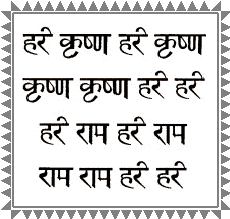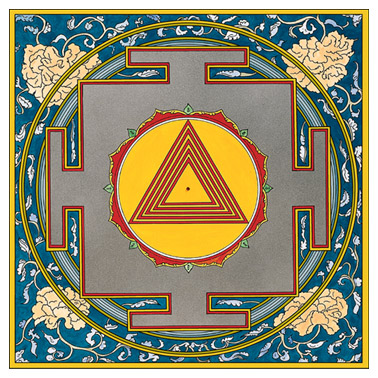
Sanskrit
Om
Sri Savitra Surya Narayanaaya Namah
 Sanskrit,
the language used long ago by religious
scribes and wise men, nowadays conveying ancient messages to us from
holy texts,
is presently only a liturgical language
like Latin. The Indian Vedas were written in Sanskrit.
In addition to liturgical purposes, this language is spoken at some
places even today, particularly in some institutions where people
feel the need to reinvigorate it. In the Indian state of Madhya
Pradesh, there are villages where ordinary people speak Sanskrit.
Sanskrit is used also in Mattur, a village in the Indian
state of Karnataka.
Sanskrit,
the language used long ago by religious
scribes and wise men, nowadays conveying ancient messages to us from
holy texts,
is presently only a liturgical language
like Latin. The Indian Vedas were written in Sanskrit.
In addition to liturgical purposes, this language is spoken at some
places even today, particularly in some institutions where people
feel the need to reinvigorate it. In the Indian state of Madhya
Pradesh, there are villages where ordinary people speak Sanskrit.
Sanskrit is used also in Mattur, a village in the Indian
state of Karnataka.
Similarities between Sanskrit and other languages
Throughout their long but preserved
existence, Hindu gods
have taken other form than the one they had originally had
in the Vedas. At early historical times,
Surya was more important than Vishnu.
Shiva, too, does not have His name (Shiva)
in the Vedas. Scholars believe that a much older name represents
Shiva instead - Rudra, which sounds
like the word used for the most ancient Slavic god - Rod
(primordial god) - creator
of the universe. 
You see Sanskrit letters on the picture
on the left.
The origin of the word "red"
(English), or "rot" (German)
probably comes from the primordial adoration of the god
of fire, most likely a deity like Slavic Rod,
Hindu Agni, or Rudra.
You will find many words with similar sounding (and spelling) both
in European languages and Sanskrit - for example, the Sanskrit word
"rakta" - English "red"
("rudy" in Czech, "rouge" in French, "rojo"
in Spanish, etc.). The origin of the word "red"
most probably dwells in fire, which was adored and personified by
all ancient and tribal cultures.
Every religion, although surely partially based on real events, somehow
deforms or changes
over time. Slavic people have the following legend about the creation
of the world:
In the beginning, there was only
the great darkness and endless chaos. Its waves whirled
in the empty space and flowed around the golden
egg, which was in the middle. Rod
- the originator of everything - was in the egg.
When Rod uttered his first word,
his son Svarog was born.
The Slavic creation legends slightly
vary in dependence on the region they come from (Serbia, Slovenia,
Russia, Poland, etc.). Swarog or Svarog is the Slavic
sun and fire
god. In the Slavic religion, Svarga
is heaven. In Sanskrit, Svarga
is heaven too. 
You see Sanskrit numerals on the picture
on the left.
Some Hindu gods have remarkable similarity with Slavic
deities - both in pronunciation and in significance. Sanskrit
and Slavic words may not be always entirely similar (in pronunciation
and connotation), but may carry remarkable elements
of similarities like in the case of the Slavic god
Veles (god of shepherds and a
great serpent), who bears a resemblance to
Vedic Vala, a Hindu Naga (serpent)
and Asura (mostly sinful and power-seeking deities) mentioned in Rig
Veda over twenty times.
Lord Shiva's attributes are materialized in
the Slavic female deity called
Siwa, Ziva, or Zivena
- goddess of fertility and
love. A similarity with Sanskrit appears in the fact that
the word "ZIVA" means
(in Sanskrit) "the one who is kind".
Unlike war or scorpion goddesses, goddesses of love are kind for most
of the time.
There is yet another similarity
between Shiva and Ziva
- goddess Kali and Morena, the
sister of Ziva. Both Kali
(Hindu goddess) and Morena (Slavic
goddess) are goddesses of death.
In Hinduism, Kali is tightly associated
with Shiva, as She is a form of
Durga, the Shiva's
consort. There is not a big difference between these two, as
Shiva's association to Kali is as
strong as Ziva's connection to Morena. If we look
at similarity in pronunciation, Slavic Morena has its equivalent
in the Sanskrit word maraNaanta
(coming to death).
As concerns symbolism, lingam is
a Hindu (Shiva's) symbol for fertility
- the same dimension that ancient Slavs
attributed to Ziva.
Vedic god Surya has his Slavic equivalent
in goddess of beauty - Zora,
Zarya, or Zori. There
is also the word Zorya - it identifies
less important goddesses - Slavic guardians
of the dawn. The connection to the sun
is indisputable.
Brief summary of Slavic gods
Rod (Creator)
> Svarog (sun god and helper creator)
> and his three sons > Svarozic, Dazhdbog,
and Perun. Perun is most probably derived from Vedic deity
Parjanya (the rain god).
Triglav is a Slavic word for
someone (god) "with three heads"
- the Divinity almost identical to the
concept of Hindu Trinity (Trimurti). The oldest meaning
of the word Triglav had most probably denoted the following
three deities - Svarog, Perun, and
Dazhdbog; however, Veles
or Svantovit later replaced Dazhdbog.
Triglav has its Hindu equivalent
in Dattatreya - Brahma,
Vishnu, and Shiva (all
as one God). Hindus believe that this form of God (Dattatreya)
had once appeared here on Earth.
Slavonic svastika
Hindus use svastika as
a symbol of good luck.  Boreyko
coat of arms is the Slavic symbol of svastika
pointing to the left; it had been used in Poland. Svastika
can also be found in symbolism of Svarog
(picture on the left).
Boreyko
coat of arms is the Slavic symbol of svastika
pointing to the left; it had been used in Poland. Svastika
can also be found in symbolism of Svarog
(picture on the left).
Christians destroyed almost all cultural heritage of the Slavs, so
our knowledge about Slavic deities is not so comprehensive
as in Hinduism, which has continued almost entirely
preserved from the ancient times until today.
A few Sanskrit and Russian words: a comparison
Slavic languages are similar,
so the comparison shown below is made of words that sound
equally and mean the same thing in Russian,
Czech and Slovak.
If you want to find out more about Sanskrit
words, visit this website.
The first words on the left are in Russian,
then follow words in Sanskrit, and finally
their meaning in English:
vsegda sadaA
always
putnik pathika
pilgrim (or traveler)
zit jiivati
live (pronounced similarly in Russian and in Sanskrit)
kogda kada
when
nebo naaka
heaven
snežnij sahima
snowy
mama maatR
mom
brat bhraatR
brother
We can also look at similarities in grammar.
Slovaks and Russians use vocative,
which is a term hardly explainable in English in one word, as English
(and many other European languages) does not
use it (Sanskrit does). Vocative
is scarcely present in Slovak, but it still occurs. The Wordnet
dictionary of synonyms describes the term "vocative"
as the case (in some inflected languages)
used when the referent of the noun is being addressed.
In addition, English and possibly many other European languages, except
for Russian and other Slavic languages, do not have, for example,
other cases like the locative case.
And the angel of the LORD appeared unto
him in a flame of fire out of the midst
of a bush: and he looked, and, behold, the bush burned with
fire, and the bush was not consumed. Exodus,
3:2
The Hebrew word for fire
is Esh - the English word "ash"
is derived from it. The English
word "ashes" is "aasa"
in Sanskrit.
Back


